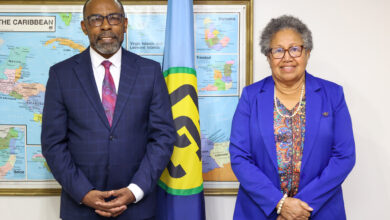(Caribbean Community Secretariat, Turkeyen, Greater Georgetown, Guyana) It is indeed a great pleasure and honour to be here and greet all my colleagues in the Caribbean Community, on the occasion of this important step in preparing for the Rio + 20 Summit.
I recall 20 years in my third year at University, the high hopes and expectations that arose in the Global Community from the United Nations Conference on Environment and Development (UNCED) in Rio. The plans that were agreed to, the Global Environmental Treaties signed unto, and the promises to dedicate a small portion of the GDP towards these commitments to mother Earth.
I can also recall the commitments made a few years later in Barbados, in addressing the special needs of Small Island Developing States (SIDS); and the stock taking exercise of these commitments in the Mauritius Strategy for Implementation.
When I was ten years younger and a young professional working as a young conservationist working with the NGOs, I can recall our conscience calling, and asking us to take stock of the promises made at UNCED, versus the commitments kept. The Johannesburg Summit in 2002, did this, and refocused our commitments to priorities in trying to attain true Sustainable Development.
Fast forward to today, TEN YEARS MORE and now five weeks as Minister of FFSD: I ask, have we, the Global Community kept our prioritized commitments made in South Africa? Has mother nature been taken into consideration in our developmental strategies and plans? Or have we continued for 20 years the “business as usual” model to prosperity? Are we to “take stock” AGAIN? Assess the greater risks/ dangers we are now facing as mother earth responds to our actions?
I think we can, and must, invest our precious time and efforts more wisely. We need to plan our national development strategies in concert with the principles of Sustainable Development, uttered 20 years ago. If we do so, our Regional Development Strategy will be easier to implement.
These past 20 years have not passed us in Belize without having accomplished a few of our commitments made in Rio in 1992.
Immediately upon returning home, we established in September of 1992 the Department of the Environment: whose goals and objectives are to develop and coordinate plans, programs and activities that include the principles of sustainable development (SD). The agenda on “protection of our natural resource base for future generations” has been high in both the Belizean citizenry and it’s Government. Protection of our beloved Belize Barrier Reef is one such agenda item. We have advanced our efforts in pursuit of SD to where we recently expanded into a Ministry of Sustainable Development.
We did not succeed in establishing a National Commission for Sustainable Development (NCSD) as proposed in Agenda 21, but instead established the Natural Resources and Environmental Policy and Strategy (NREPS) committee, whose responsibility is similar to those envisioned for the NCSD.
With the sustainable development principles as the basis, we have instituted through these past 20 years, numerous strategies or initiatives that assist us in better managing our natural resources and environment. Examples include the establishment of the Coastal Zone Management Authority, the implementation of our Protected Areas Systems Plan, including the establishment of its financing arm, the Conservation Trust (PACT), the creation of a Ministry of Energy, and the passage of the Integrated Water Resource Management law policy and institutional plan, to name a few.
But, most importantly, Belize has invested greatly in building its human resource capacities in the areas of sustainable development. These people are the ones knowledgeable and trained in the strategies and plans needed to pursue a sustainable development path. These are the young men and women that are now in key positions in Belize’s government, civil society and in private sector. Without their understanding and support of the principles of sustainable development, Belize would not be in the position it now is, poised to be a global example of sustainability.
Enough about the National Perspective: We are here, about to embark on a task given to us – Ministers of Environment. That is, establish the Caribbean Position to be carried to Rio + 20, to be held in just a few weeks.
It is my opinion that in order to a have the task before us, there is the pre-requisite that WE be interested in the task at hand. The presence of all my Ministers of the Environment colleagues at the table is critical. Without every member’s input, it will be difficult to achieve a true regional position.
The assistance of the Secretariat is critical in this task. We need a capable and responsive Secretariat, one that is well equipped and financed to accomplish this critical work.
Coordination at a National Level is critical. I mentioned a few examples of what Belize has done in this endeavor. Every member country needs to also strive towards this goal.
I would encourage we use the BUREAU established some 3 years ago to better coordinate Environmental / SD strategist for the Caribbean.
The major issues that are on our agenda today are the Green Economy concept and the Infrastructure for Global Environmental Management. We have been discussing these topics and the decisions we take today will be crucial to our impact at Rio.
I encourage us all to be engaged in today’s COTED meeting in order to get the Caribbean Position we seek.
Thank you all.




